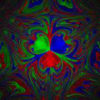According to strictly scientific thinking, causality is at most a useful fiction. No matter the event, there is only the possibility that it will happen. Some things are highly probable, but nothing can be predicted with absolute certainty, which in a way compromises the strictly materialist view they hold, and yet we perceive causality to be a reliable enough truth that we “bank” on it, as they say. Are we just misguided and science is correct in reminding us of that? Or could there be something more? Something more to the perception of causality and free will.
I remember a scientist saying that there is no known reason why the broken egg doesn’t go back into the egg shell. Yes, linear time is still a physical mystery.
I think there is something meaningful in what gives meaning to us.
I ponder momentum of thought-habits through experience. I offer that we have many thought habits or subconscious reflexes/ instincts that are well suited in helping us deal with reality. Perhaps in some case better than “rational” thought would equip us to.
Reality as we know it tends to reflect a sort of fractal pattern, like an enormous open ended mandala maybe, and the various elements of reality don’t reasonably lend themselves to judgements of “real” or “fantasy.” Our brains or minds have a long standing inheritance or legacy of dealing with the world around us in constructive ways, and were doing so well before the age of “enlightenment” as they sometimes now call it.
Without training, our minds naturally identify some conditions and events as especially meaningful. They even acknowledge this function as being vital. Without it, science itself would be impossible to practice.
Science began as a discipline originally known as natural philosophy, and it was based on what was a somewhat novel premise at the time, that the essential nature of reality could be understood through careful examination of and experimentation with elements of the world around us. Prior to that you had notions of either divine will or mandate of the personalities and behaviours of unseen beings commonly called spirits.
Well, the things our ancestors observed before the age of reason didn’t go away, but we did blind ourselves to them. Perhaps as an act of righteous rebellion against a tyranny of the human soul, perhaps from simple expediency, one of the “babies” was thrown out with the bath water.
You don’t need to subscribe to animistic notions of the world and the things present in it, necessarily, to understand the law of synchronicity. Rather the simple recognition that your brain has the ability to recognize patterns that run deeper than rationalistic thought or materialistic causality is all that is necessary to begin exploring the topic.
We have no evidence, even from a strictly scientific point of view, that the world or even the universe behaves in anything like a mechanistic way. We devise mechanistic models primarily to support our own understanding of naturally occurring events to repeat themselves, to hold true over time, the tendency to repeat themselves.
But before the age of reason, we were still able to notice these cycles. This is the reason science got started in the first place. Slap a bias on a naturally occurring intuition and you have conventional science.
Your thoughts are welcome. Be well friends.
Travis Saunders
Dragon Intuitive
~science,mysticism,spirituality~



Leave a Reply